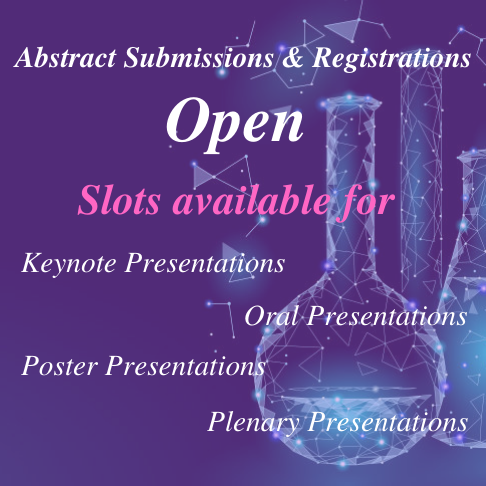
Event on: June | 24-25 | 2021
Global Webinar on
Chemistry and Applied Sciences
Theme : Advancements and Innovations in Chemistry and Applied Sciences
Webinar
Coalesce Research Group is delighted to announce “Global Webinar on Chemistry and Applied Sciences” to be held during June 24-25, 2021. This incorporates prompt oral presentations, keynote presentations, poster presentations and plenary sessions. The main theme of our conference is “Advancements and Innovations in Chemistry and Applied Sciences”.
Global Webinar on Chemistry and Applied Sciences is an international platform to debate and study varied issues like Fundamentals of Chemistry, Chemical Science, Chemical Principles, Organic Chemistry, Inorganic Chemistry, Medicinal Chemistry, Pharmaceutical Chemistry, Molecular Chemistry, Biochemistry, Physical Chemistry, Catalysis, Computational Chemistry, Electrochemistry, Chemical Engineering, Geochemistry, Green Chemistry, Analytical Chemistry, Inorganic Stereo Chemistry, Separation Techniques, Chromatography, Mass Spectrometry, Materials Chemistry, Polymer Chemistry, Theoretical Chemistry, Pure Chemistry, Applied Chemistry, Clinical Chemistry, Laboratory Medicine, Cheminformatics, Computational Chemistry, Chemistry Education, Food Chemistry, Multi-disciplinary Chemistry, Environmental Chemistry, Mechanical Chemistry, Nano Chemistry, Natural Chemistry, Nuclear Chemistry, Petro Chemistry, Neuro Chemistry, Photo Chemistry, Phyto Chemistry, Quantum Chemistry, Radio Chemistry, Sono Chemistry, Stereo Chemistry, Synthetic Chemistry, Systems Chemistry, Cluster Chemistry, Flow Chemistry, Immunochemistry, Mathematical Chemistry, Atomic Chemistry, Astrochemistry and Forensic Chemistry. Coalesce Research Group has taken the initiative to collect the planet category specialists each from tutorial and trade in a very common platform at the event.
Chemistry Conference 2021 focus on all aspects involved with the substances of matter that undergoes the investigation of their properties and reactions and therefore the use of such reactions to create new substances.
The conference provides the analysis works of Chemistry experience from varied scientific backgrounds and therefore the same may be perceived by young researchers and students.
Chemistry Conference 2021 aims to promulgate data in qualitative analysis and advances in analytical techniques. Both life sciences and chemical sciences want chemical techniques in course of analysis work and so we would be an ideal venue to share and develop data on key chemistry tools.
Who can attend?
· Researchers & Scientists
· Engineers & Analysts
· Pharmacists
· Dean & Head of Departments
· Societies & Associations
· Industries & Plants
· Technicians & Chemists
· Professionals & Experts
· Labs & Laboratories
· Colleges & Institutions
· Manufacturing Companies
· Teachers & Professors
· Students & Research Scholars
Guidelines For Speakers
Guidelines For Poster
Opportunities for Conference Attendees
Abstract Peer-review Process/Guidelines
The following are the steps that each abstract of the Conference undergoes during the process of peer review:
Criteria to be considered for Scoring:
The abstract should be reviewed according to the following criteria:
Keywords
Chemistry Conferences | Polymer Chemistry Meetings | Petro Chemicals Symposiums | Drug Chemistry Meetings | | Chemical Engineering Conferences | Materials Chemistry Meetings | Petrochemistry Conference | Medicinal Chemistry Conferences | Physical Chemistry | Computational Chemistry | Electrochemistry | Chemical Engineering | Geochemistry | Green Chemistry | Analytical Chemistry | Inorganic Stereo Chemistry | Separation Techniques | Chromatography | Mass Spectrometry | Materials Chemistry | Polymer Chemistry | Theoretical Chemistry | Pure Chemistry | Applied Chemistry | Clinical Chemistry | Laboratory Medicine | Cheminformatics | Computational Chemistry | Chemistry Education | Food Chemistry | Multi-disciplinary Chemistry | Environmental Chemistry | Mechanical Chemistry | Nano Chemistry| Natural Chemistry | Nuclear Chemistry | Petro Chemistry | Neuro Chemistry | Photo Chemistry | Phyto Chemistry | Quantum Chemistry | Radio Chemistry | Sono Chemistry | Stereo Chemistry | Synthetic Chemistry | Systems Chemistry | Cluster Chemistry | Flow Chemistry | Immunochemistry | Mathematical Chemistry | Atomic Chemistry | Astrochemistry and Forensic Chemistry |
